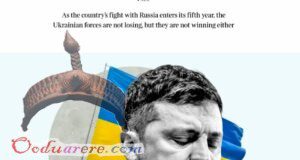By Sergio Weigel
In Germany the most powerful political force is the media which has been chasing politicians to make the policy their masters, “neoliberal” think tanks, bank and industry lobbies and Atlanticist think tanks aka Warshington, wanted. But German state media had recently cracked open the narrative.
Something strange has happened in German media. After years of streamlined and very constrained news coverage of the Syrian war with the clear goal to form public opinion in the sense of Warshington, German state media suddenly cracked open the narrative regarding the alleged gas attacks in Douma. On the Skripal case they were still in full lockstep with the Anglo-American narrative. However, when the White Helmets staged a chlorine gas attack in Douma shortly after, at least some state media didn’t march in lockstep. Instead, news anchors used careful phrases like “alleged gas attack” or “possible gas attack”. I noticed it immediately and it raised my eyebrows. That’s unusual, I thought. Every stupid helmet lie before was just repeated as fact, yet this time they seemed more cautious. Then the unthinkable happened. A “Western” journalist, Uli Gack from ZDF, actually went down there to Damascus to visit a refugee camp and ask the locals about what happened. This was then broadcast on the daily news show heute journal (today’s journal). See for yourself:
Of course, he was immediately attacked by our Atlanticist print media, namely by Germany’s chief mudslinging tabloid Bild and Focus, a minor magazine that is usually found in doctors’ waiting rooms and read by people who don’t fancy magazines about furniture. He was labeled a “conspiracy theorist” who “spreads Assad’s and Putin’s propaganda”, who either “has no clue” or “lies deliberately”, the usual kindergarten. Unfortunately, the ZDF didn’t stood up for him but instead distanced itself. So, in a second report which was broadcasted two days after, in which he visited the same hospital Russian soldiers had previously searched for victims, he made or had to made it sound like the witnesses were selected for him by the Assad regime. This is what we call Bringschuld in German, duty to deliver, and it was as obvious as cake that he has been made to say it. Nonetheless, he’s done it, he interviewed victims at site and presented the results. Someone at the ZDF must have told him to, because Mr. Gack is not exactly known as an honest, impartial journalist, I doubt it was his idea. It’s sad that the cowards at the ZDF caved before the tabloids, but it was remarkable nonetheless. After all, ZDF is Germany’s largest TV station and heute journal is the second most important daily news show.
Phoenix is a channel in collaboration of ARD and ZDF. It was founded originally for live broadcasts of debates in Bundestag, you know, to promote the impression of transparency to the citizens. Now, they also have mostly great documentaries and this particular political talk, of which I want to give an example, called phoenix round. Phoenix is not the ZDF, but it is viewed by a respectable number of people, usually around four million per day, who prefer television that feeds the head instead of numbing the mind. This is the first time ever that I saw a political talk on German TV where a guest is allowed to give a full summary on the genesis of the Syrian conflict, claim that all chemical attacks have been false flags and make his argument about it, that Russia has a clear strategy and will determine the endgame, and that the US has lost the quagmire in Syria and Iraq. Watch it, it’s 46 minutes long, and I’ve tried my best to make the subtitles as understandable as possible, especially in heated moments of the discussion. It’s from April 12, so they’re discussing Trump’s tweet and what he’s gonna do now.
These are singular incidents, but they are remarkable. Anglo-America’s propaganda and false flag pets in Syria, the White Helmets, report a poison gas attack by the Syrian air force and Germany’s largest TV station sends a veteran journalist down to Damascus to interview witnesses of the incident after four years of dutiful propaganda service. In a political talk show two guests are allowed to explain how the war really came about and what the reality on the ground really looks like, even declare, including the host of the show, that the US has lost the war! This is remarkable because it happened on state TV. To understand why that matters let me explain how German media is structured in general.
The German mainstream media landscape consists of mainly three areas. Private TV and radio, state TV and radio, and the print media. Private media brings the typical mind numbing and spirit crushing entertainment as a vehicle to sell advertisements.
State media, TV and radio, called öffentlich-rechtlicher Rundfunk (public-legal broadcast) has been created after the war modelled after the BBC. It is funded by a compulsory levy. Regardless of whether you even have a TV/radio or not, every household is forced by law to pay a monthly fee of €17.50. It pays for several broadcasting services, one for almost every Bundesland, integrated in the “first channel”, the ARD, but they also have their own channels. Then we have the ZDF, the “second channel”, which is also the largest TV station in Germany, plus several smaller collaborative channels, such as Arte, a collaboration with French public TV in the spirit of cultural exchange.
These channels have the legal assignment to educate and inform, and in many ways they actually do. They have plenty of interesting documentaries on various stuff, and also sometimes by far the better films (European cinema), but when it comes to information things become complicated. There is a legal precept of distance from government. They’re supposed to be independent. However, the intendants are usually active party members of either CDU (ZDF) or SPD (ARD), so of government parties. There have been several lawsuits at our Verfassungsgericht (supreme court) over this – without success.
Also, there are issues with how the funds are used which have also been trialed at the Verfassungsgericht. For example, most political talk shows are run by women, coincidentally I guess, and named after them, such as Maybrit Illner or Anne Will. The shows aren’t produced by the broadcasters themselves but by private companies for ridiculously high prices they could never achieve on the free market. Now guess who the main shareholders of these companies are? You guessed right, it is the respective host of the show. This makes them corruptible, of course, since to get paid so well in the future they will have to follow a certain line, most likely determined by the party member intendants, but maybe also by Atlanticist interference. Their guestlist is usually crammed with members of the infamous Atlantikbrücke.
The real dangerous media in Germany, however, the one that can undermine state authority by manipulation of public opinion is the print media. Bild, Spiegel, Zeit, FAZ, Süddeutsche, welt, and taz are the most important. In the 80s each each one represented a certain political group or party and/or social class. However, this started to erode in the 90s when the former left couldn’t handle the fall of socialism and substituted its original ideals with liberal petty nonsense like gender ideology and adapted liberal globalism as inevitable. Today they are completely streamlined and all the same: Atlanticist. It is as if Goebbels had returned from his grave with an Uncle Sam hat. All editors-in-chief of these rags are members of at least one of the notorious Atlanticist organisations, camouflaged as intercultural and intellectual dialog platforms yet essentially run by the CIA: Atlantikbrücke, German Marshall Fund, Aspen Institute etc. We know this from late whistleblower Udo Ulfkotte, and from the brilliant satire team Die Anstalt who made these things known to a broader public.
The problem with these rags is that they still enjoy tons of trust with certain age and social groups. Take baby boomers with a higher education, for example. They trust rags like FAZ or Zeit which still enjoy an intellectual reputation. It’s true, both boast a thick feuilleton. If you want to know about theater, opera, literature in Germany and elsewhere, FAZ and Zeit are the way to go. Since reputable baby boomers enjoy to cultivate their sophistication, these are their newspapers. And why should the articles about world politics be less sophisticated than the feuilleton? So they mistake warmongering and lies about Russia with quality journalism.
However, the real danger from print media comes from their ability and habit to witch hunt politicians and shame celebrities who fall out of line. They’ve managed to force former German presidents Horst Köhler and Christian Wulff to reign, because they expressed some inconvenient truths (the Bundeswehr is in Afghanistan not to help but for economic interests) or views (Islam belongs to Germany – at a time when Muslims were still the enemy). Also Germany’s most famous soul singer Xavier Naidoo fell victim to an absolute hate campaign, because he had openly stated that Germany is not a sovereign country. This is (supposed to be) a taboo, and even though it’s true, you’ll be shamed as a Nazi by usual suspects. With ex-chancellor Gerhard Schröder they had played a more subliminal game and ran a successful campaign to have him voted out of office and Angela Merkel into office, because was the first to say nein to Warshington’s aggression against Iraq.
So why did state media suddenly cracked open the narrative on such a huge case like an alleged poison attack by Assad the monster? And why at this point in time? I don’t think this is going to be a constant change in reporting on German TV, at least not yet, but I a believe it might have had to do with Angela Merkel’s visit to Warshington. Germany is not just a vassal like France and certainly not a whore like Poland, the German-American relationship is much more complicated. However, by bilateral contracts with the US and even by the 2+4 contract Germany still is, in many ways, an occupied country. The US military and even more so it’s “intelligence” has rights that go beyond our constitution. I will write about this in more detail, but for now it is enough to understand that the German government cannot make official statements as easily as the governments of a sovereign country like Russia or even France can. If a politician does it, he or she will be ousted by the print media as described above. Therefore, the German government every once in a while sends a message this way. In this case it was a warning: Look, we could unleash the truth on our public. Germany has many ways to pressure countries in the EU politically, but next to none to pressure Warshington without risking an open conflict.
At least, during her visit Merkel managed, in her unparalleled Teflon style, to shrug off all of Trump’s ridiculous demands. But more of that later.
Sergio’s Bio: Born to a Portuguese mother and a German father Sergio was raised in Northern Germany, just two kilometers away from a British-German NATO air base. The daily sonic boom and thunder of low altitude Tornados was the sound of his childhood. They years when NATO wanted to station Pershing-2 missiles with nuclear warheads at the air base, were formative for him and he can still vividly remember the Cold War, Reagan, Thatcher, Chernobyl, the claustrophobic atmosphere, and the relief when the Berlin Wall finally fell. He makes his living as a web-programmer and IT consultant but still avidly studies studies history, geopolitics, economic theories, monetary theory, Hegel, Nietzsche, Marx and music.
 Ọmọ Oòduà Naija Gist | News From Nigeria | Entertainment gist Nigeria|Networking|News.. Visit for Nigeria breaking news , Nigerian Movies , Naija music , Jobs In Nigeria , Naija News , Nollywood, Gist and more
Ọmọ Oòduà Naija Gist | News From Nigeria | Entertainment gist Nigeria|Networking|News.. Visit for Nigeria breaking news , Nigerian Movies , Naija music , Jobs In Nigeria , Naija News , Nollywood, Gist and more









